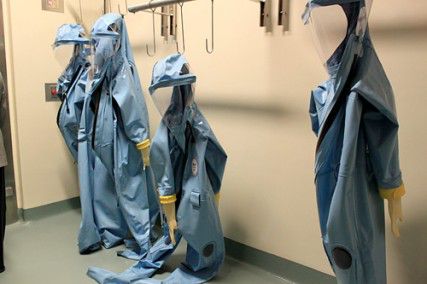
Boston University’s National Emerging Infectious Diseases Laboratories will not test lethal, infectious diseases such as Ebola without opposition, community members said at a forum on the biolab Thursday evening.
About 200 Boston residents gathered at Roxbury Community College for the final meeting of the National Institute of Health’s risk assessment of the biolab.
The biolab is currently conducting Level 2 research on tuberculosis and other lower-risk diseases, but since its opening in 2008, Level 4 testing for more fatal diseases has been unapproved.
The NIH invited community members to the meeting for a presentation by infectious disease expert Dr. Adi Gundlapalli on the results of the NIH’s most recent draft of the biolab’s Supplementary Risk Assessment.
The forum gave residents the opportunity to make comments and pose questions to the NIH before it releases its final risk assessment of the biolab.
During the course of the evening, about 55 members of the audience commented on the 1,700-page risk assessment draft, which the NIH claimed is 90 percent complete.
Among those lodging comments were politicians, attorneys and residents, as well as four BU students and one BU professor.
“Residents – speak up, speak out. Let them know that this is not fair and that we don’t want this thing in our community,” said Klare Allen, a community organizer with Safety Net. “They have not proved that it is safe for it to be in our community and we will not stand for it to be in our community.”
Following Allen’s invitation, the first community speaker of the evening gave the sole comment in favor of the biolab.
“I feel the facility has the potential to do life-saving research, and therefore, I am in favor of it,” said community member Kevin Norton.
After Norton’s comments, two attorneys whose firms are in litigation opposing the biolab criticized the risk assessment for not providing any concrete information about the possible risks of the facility.
“The problem here is that the uncertainty of that 1,700-page document is tucked away,” said Laura Maslow-Armand, an attorney with the Lawyers’ Committee for Civil Rights. “It is disguised as expert opinion when there is lack of knowledge.”
Maslow-Armand said the entire process of building and obtaining approval for the facility was polluted with bad faith, environmental racism and violations of civil rights.
“My message to the agency is this: If this is the best you can do, then this draft risk assessment has made one thing extremely clear. The NEIDL must not operate in this location,” said Jennifer Rushlow, an attorney with the Conservation Law Foundation.
Roxbury’s political representatives made comments on the latest risk assessment with their fellow residents.
“I [was] against it then and [am against it] now, a Level 4 biolab built in the heart and soul and the most densely populated part of the city of Boston is endangering not just the communities of color, but the entire city,” said Massachusetts Rep. Gloria Fox, of Roxbury. “They still have not proven that our concerns have or would be resolved, so we have to really continue to struggle.”
Boston City Councilor Tito Jackson, of Roxbury, was also in opposition to the biolab.
“I stand with my community – in defense of my community – against this project,” Jackson said. “It is very simple: Our community will no longer get dumped on.”
Members of the medical community came out to voice their concerns against the proposed biosafety lab.
Sandy Eaton, a Boston resident and retired registered nurse with 48 years of experience, said she was not in favor of the plans.
“As someone who has been a practitioner at the bedside in all kinds of scary situations starting from the beginning of the HIV epidemic, I am not afraid of germs,” Eaton said. “I am afraid of arrogant bureaucrats.”
























































































































